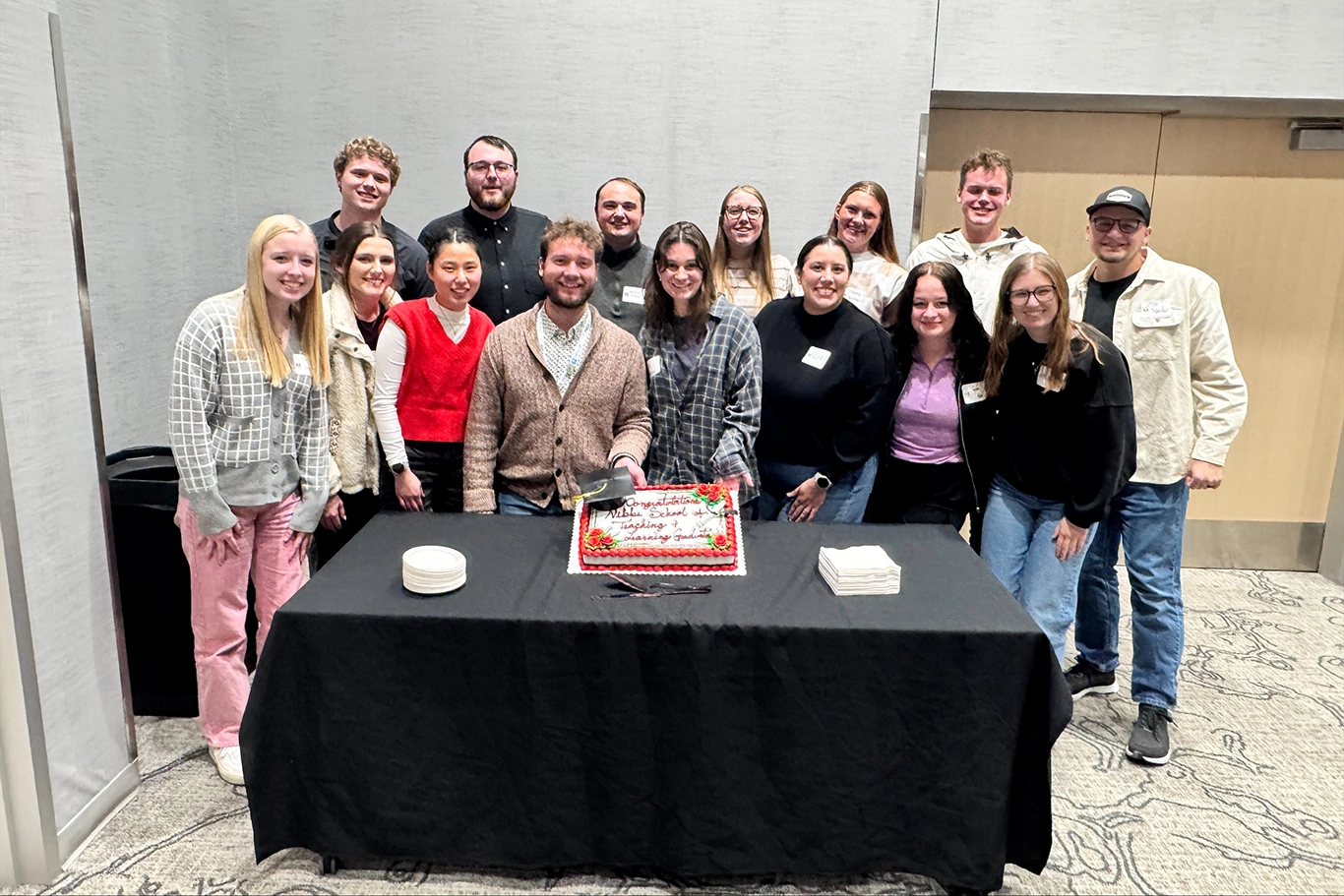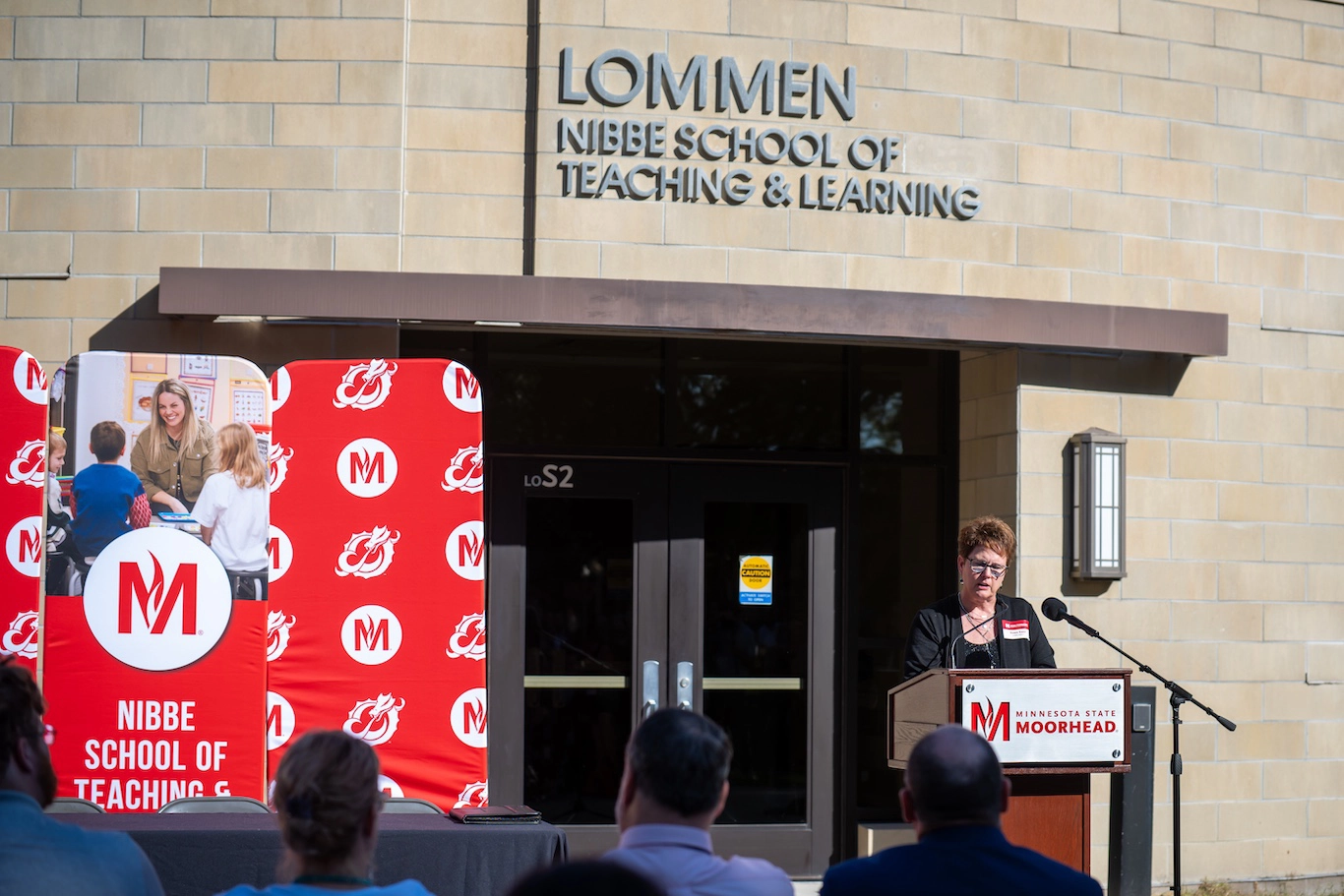Living the (Food) Life
Like cherished family recipes, the love for producing food is often passed down from generation to generation. Growing, harvesting and distributing the fruits of one’s labor is an intensive process, a lifestyle requiring grit and determination from all involved day in and out. From tree to table, these MSUM alumni share and celebrate their love of food with family.
Family Traditions
What started as a hobby to put maple syrup on the table in 1928 turned into a thriving, multi-generational business for the Anderson family. Ninety years later, Anderson’s Maple Syrup is flourishing and operated by the founder’s grandson, Steve Anderson, and his wife Alison (Weis) Anderson ’96 (speech, language, hearing sciences).
Steve grew up learning how to gather sap, cook it into syrup and bottle the pure maple syrup for sale. As his father and grandfather before him, Steve recognizes the value of hard work, a great tasting product and a little bit of luck.
“It was an easy choice for me,” Steve said. “I did not know what else to do and this became my default job early on. Working in a small company and in a small industry affords many great relationships with producers and other packagers I don’t believe you can get in any other industry.”
At the height of production in the early 1980s, the Andersons were tapping around 18,000 trees and collecting the sap in buckets. Now they’ve upgraded to a vacuum system and refined their focus to primarily packaging syrup—a more sustainable business for their family.
“What’s important is that we can all be together,” Alison said. “Our kids come to work with us. They’re part of it. It’s a place where not only our kids, but our employees’ kids get to come hang out if they need to. We want to make it a fun place for everybody.”
Like the Andersons, David and Susan (Rognlie) Cowan ’82 (accounting) always knew farming was a lifestyle they wanted to pursue.
“I grew up on a farm and I didn’t know anything else,” Susan said. “I loved the lifestyle and always assumed that’s what I would do, too. It’s been great.”
When the Cowans were unsuccessful in procuring family land in the Midwest after graduating college, they packed up and headed west. In 1986 they purchased 15 acres of land in Washington’s Yakima Valley and began Cowan Fruit.
They purchased additional land as it became available and now operate on 360 acres, growing 21 varieties of apples, pears, cherries and wine grapes. Due to the cyclical nature of crops, the Cowans operate year-round.
They also own and operate Cowan Estate Vacation House—a 3,600 square foot home sitting on 65 acres of land in the heart of Washington’s wine country.
“It’s a lifestyle,” David said. “You start out in the morning checking water and throughout the day you check on people, crops and see what needs to be done—spray or prune or thin. Then you end the day by checking water and start over the next day. We worked our way into it, so we knew what we were getting in to.”
Gary Hogle ’88 (business administration) also knew he’d have a lot on his plate when his father founded Twin Pine Farm in Scandia, Minn., in 1994. Although the family began by hydroponically growing tomatoes, greens and herbs, the economy and product demand have steered them solely into the honey business.
“The upper Midwest has some of the best honey in the whole world because of the environment, temperatures and type of flora,” Hogle said.
Twin Pine Farm produces 14 varieties of flavored honey, with customer favorites including amaretto, anise, cinnamon, lavender and tangerine. Hogle also takes special requests, like pine-flavored honey.
“I want people to enjoy what I do. It’s satisfying to produce something and someone says to you, ‘This is really, really good,’” Hogle said.
The Perfect Recipe
Many consumers don’t think about what happens behind-the-scenes as long as they’re served a great-tasting product. Surprisingly, it’s a fairly scientific process on all fronts.
“Food production is chemistry; combining foods and making sure the end product is stable and things of that sort,” Hogle said. “I have a set of flavor standards, but I use my own tongue essentially to know. Every barrel of honey I get is slightly different flavored. There are almost a limitless number of flavors possible.”
Similarly, the Andersons say producing a consistent maple syrup product takes years of experience and gut instinct. Various grades of syrup are mixed into a consistent product so consumers know what to expect when purchasing Anderson’s Maple Syrup.
“In the spring when you’re making syrup, you get different grades according to when the syrup is made. It has to do with how much bacteria is in the sap,” Alison said. “It’s very scientific.”
This naturally occurring bacteria in the air also helps trees heal after taps are pulled in the spring and is safe for human consumption.
Though the Anderson family still taps around 5,000 trees, they sell their sap and instead purchase syrup, mix for consistency, bottle, label and ship to nearly 8,000 grocery stores nationwide.
Hogle purchases his honey from a local beekeeper. He then adds fruit concentrate or food-grade essential oil for flavor, packages and distributes. Though Hogle says purists are often put off by his flavored honey, he likens his products to chocolate milk.
Twin Pine Farm labels for one of the largest honey distributors on the East Coast, so thankfully, the worldwide colony collapse disorder hasn’t affected Hogle’s business.
“We’re fortunate we don’t have colony collapse here,” Hogle said. “Without the bees we’re going to go hungry, and that is not an exaggeration by any stretch of the imagination.”
Research indicates bees and other pollinators help nearly one-third of the world’s crops thrive. Bees are also responsible for pollinating an estimated $15 billion in U.S. crops each year.
Choosing the right varieties to plant is of great importance for the Cowans. With most apple trees producing for only 10 to 15 years, every decision can determine the business outcome for the foreseeable future. Crop diversity is key.
“It’s extremely labor and capital intensive,” David said. “You’re taking a risk on picking what variety to plant because if you pick the wrong one you’ll be out of business pretty fast.”
Sweet Taste of Success
Though it’s located in a town of less than 4,000, the honey produced by Twin Pine Farm is gaining international success through a private label they supply on the East Coast.
“They supply [our honey] to all their shows on the Food Network. We’re on the shelf in the Smithsonian Institute, in their store,” Hogle said.
The flavored honey Twin Pine Farm produces is also featured at Disneyland and Disney World, first class Air France, British Air and various European hotels. They’ve even had requests from the University of Notre Dame and the king and queen of Sweden.
The company’s success comes down to integrity.
“You use the very best ingredients you can possibly get ahold of and you make sure the jars are polished when they go out,” Hogle said. “We try to do everything to give our customers the absolutely best product. If we don’t we will fail.”
Knowing they’re part of the dwindling number of farmers feeding our nation provides an intrinsic reward for the Cowans.
“It’s nice to grow food for people,” David said. “It takes a certain kind of person that’ll do it, because a lot of people in cities and towns don’t have a clue where their food comes from.”
For those who want to learn, the Andersons are providing tools. Alison and Steve authored a beginner’s guide, “How to Make Maple Syrup: From Gathering Sap to Marketing Your Own Syrup.”
Upon receiving the initial draft, their publisher asked the Andersons to make the instructional book two-thirds longer. For three months, Alison sat in Steve’s office, asking the third-generation expert questions whenever they crossed paths, tweaking his words for reader relatability.
“It was a pretty quick process. I don’t know if that’s how everybody writes a book, but it worked for us,” Alison said.
Though they’ve found success in both the food and publishing industries, at the end of the day it’s all about family. Though Steve decided to follow in his father and grandfather’s footsteps, there’s no pressure for Steve and Alison’s children to do the same.
“We certainly don’t want to dissuade them from doing [what they want] because we realize that you need to do what you love,” Alison said.
Through good times and bad, recognizing the value of family gets these producers through.
“[My father and grandfather] were both the hardest workers I knew, but they also knew how to enjoy their down time with family,” Steve said. “I am motivated by how easy I have it compared to what they started with. I know I don’t work as hard as they did, nor can I, but I hope I can work smarter.”
This story was first published in Moorhead Magazine, Fall 2018.
Make Sure Your Story Is Heard
Let us know how your life has been changed by being a Dragon: tell us your Minnesota State Moorhead story today!
Send Us Your Story


